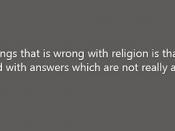How one feels about the topic is an issue that lies not in the fact of who the person is, rather it lies with the fact that how the person became what it is. It lies in the shaping up of their perception - that goes far beyond people think it does. As early as one speaks a single word; as early as one begins walking; AS early as one is BORN. However, that study is based on one's destiny, which cannot explain the generality of the topic.
Culture or religion?Quite controversial, but easily distinguishable. Religion defines culture and culture is the framework for religion. Even though they're excessively interconnected, a fine line still separates the two. Living in a high context culture where relationships are of longer durations and family ties and bonds are stronger, any religion may view PDA's as an offence. Such a general claim is also true for low context cultures, only that it is an accepted practice for them.
Even in the case of religion. Certain religions have a complete set of rules that define how a follower is expected to thrive in the society. So it doesn't matter if a follower lives in a high context or a low context culture, what matters is the religion they follow and how rigidly do they follow it.
Values or Ethics?Seeing beyond the perspective of culture and religion, there are standard values that a society instills in a person. It refers to where and how a person grows up. And ethics are morals instilled by one's own sense of judgmental ability, what they consider is the thin line between right or wrong. Values make the choice, and ethics help them make the choice. Eventually, with PDA it all ends up at at one's own conscience, one's own standard of ethics.
People are different. Generation gaps exist, and rightly so. Aunties and uncles feel a lot differently than do their younger counterparts. But this does not define what is essentially right or wrong. One cannot express to a stranger how they feel about a certain someone. Nor can one judge another person on what they see depicted in their acts. If you are immensely attached to someone and do not care about what the world thinks or does, you may be justified in your claim in favor of PDCs. You do not care about prying eyes, you do not care whether you're right or wrong. Your display of affection is what your mind guides you on and you rightly follow.
On the other hand, there are those who perceive such acts as tokens of liberalism, and who 'showcase' their PDA'ic skills in lieu of gaining attention.
Attention from those that share their mindset, from those that feel the 'need' for such displays. These are, what I feel, the real culprits. These are those that spread the filth. Not the filth of PDA's by themselves, but the filth of PDA's being an important sign of showing others your love for someone. The filth of the MOTIVE.
MEEEDIA!Focusing on the topic from a wider perspective, it seems that people don't have a choice. It really ends up with what media portrays to the general public as accepted and rejected. It is part of the western culture and a Christian wedding that the bride and the groom kiss in front of everyone, signaling their marriage and their closeness. When such acts become a norm, and spread into societies that think on the contrary, problems emerge. Society gets divided into people who accept such acts and those that don't. A diverse culture, therefore, houses multiple schools of thought. Problems never arise when people think that way, they arise when people actually enact the way they think - albeit naturally as it becomes second nature to them (goodbye kisses, holding hands while walking etc).
Taking, for example, the Lahore University of Management Sciences, where students are present in a plethora of cultures. A quick stat check of the acceptability level of PDAs when viewing LUMS having a set of standard values, it shows a 10:1 ratio of students in favor (those who allow and those who're indifferent) of PDAs. This high level of acceptability is through an excess of a variety of factors that are mentioned above, and of the 'liberal' projection of the university itself. Though the vision setters may be justified by the aim enhancing their students with a tolerance and experience level that spans across borders, but is the experience REALLY worth the cost? Can the damage done to the whole society be forgone JUST for the benefit of the prevailing university culture in isolation?Whatever the truth be, one thing is for sure. Practices and norms are always relative, and cannot be varied so easily. But what can be done is to set parameters within which those norms are allowed to easily vary, so that they never cross the limits. Those limits, however, are also not something that can be fixed. EVERYTHING⦠DEPENDS!





